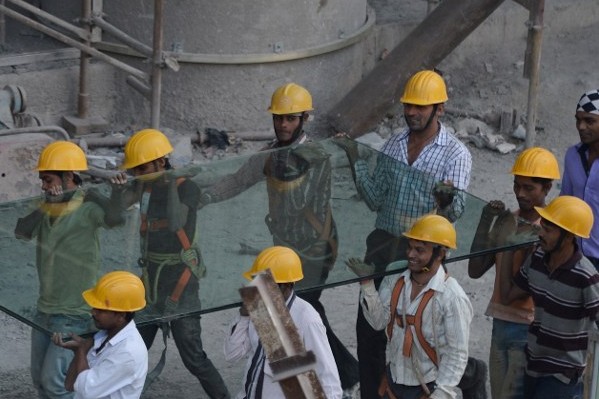Abducted Indians Killed By The Islamic State? MEA Denies Reports
Where are the kidnapped Indian construction workers?

NEW DELHI: Responding to reports that 39 Indians -- who had been kidnapped by the Islamic State (IS) when the militants captured the city of Mosul in June -- had been executed, External Affairs Minister Sushma Swaraj said that the government has no information regarding the killing of the kidnapped Indians.
The reports emerged when two Bangladeshi workers -- Shafi and Hasan -- who were working for a construction company spoke to ABP News from Kurdistan’s capital Erbil. Shafi and Hasan relayed news of one kidnapped Indian -- Harjeet Masih -- who had managed to escape the Islamic State and had told them of the fate of the 39 Indians who remained in the militants’ hold; all 39 had been executed by the IS, Masih reportedly told Shafi and Hasan.
The report, soon picked up by Indian media, prompted the Congress party to move that the government has known about the fate of the Indian nationals. Countering this claim, speaking in the Rajya Sabha on Friday, Swaraj said, “We have information from six different sources that the 39 Indians kidnapped in Iraq in June have not been killed… It is my responsibility to continue with the search on the basis of statements of these 6 sources.”
The kidnapped Indian nationals -- who have been missing for almost six months -- were working with a Turkish construction company in Mosul when the militants took over.
Although India stepped up efforts to bring back Indians based in Iraq following the advance of the IS, the MEA has been fairly silent on the status of the 40 hostages. It is not even known whether the Indian government has any idea about their location, or whether contact with the militants has been established for their release.
Soon after the kidnapping, ANI news agency quoted a number of family members expressing their frustration and demanding answers on the progress being made to secure the release of the construction workers. "We are going to meet the External Affairs Minister. We have not got any information (about our relatives) as yet. We will plead with her to bring back my brother who is stranded in Iraq. This is the second time we are going to meet the External Affairs Minister,” a relative was quoted as saying, adding, "If we do not get a satisfactory response, then, we will sit on protest at Jantar Mantar."
Another relative was quoted saying, “I am going there [to meet Swaraj] again. I will plead with them to bring my son back. I think there must be an opportunity in India so that youths do not have to go to work abroad? We want our son back, or else, we will sit on protest at Jantar Mantar."
India celebrated the safe return of 46 Indian nurses, who had been stranded in Tikrit as the IS militants took control of the city, as a diplomatic success. Even then, the nurses were quoted by the media portraying a grim situation, with the Hindustan Times quoting one of the captive nurses, Sona Joseph saying, “Our government wasted a lot of time. Now, they can send coffins to take us back.” “We were politely resisting their moves to shift us from the hospital but now their tone is different. We have no option but to obey them,” the nurse added in reference to a complication in the hostage situation that involved shifting from Tikrit to Mosul.
On arriving in India, one of the nurses told Reuters, "I thought I will never come back. I thought, (in the) last two days I am finished. These are my last days.”
The Indian government, however, did not share details concerning the release and return of the nurses, with the Foreign Ministry saying that diplomatic channels and “unconventional methods” were behind the release. "There was an enormous amount of effort that was put in both within Iraq and outside Iraq," spokesperson Akbaruddin had said.
The same level of secrecy surrounds the Indian government’s dealing with the hostage crisis involving the construction workers in Mosul. If the safe return of the nurses was a diplomatic success, the lack of information regarding the construction workers is bordering on turning into a major diplomatic failure.



